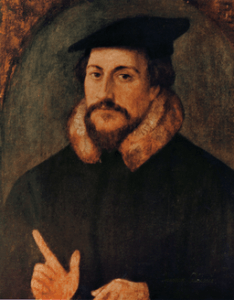
The German philosopher, Max Weber (1864 – 1920) is often regarded as one of the “founding fathers” of the discipline of sociology. Like Karl Marx, he was interested in understanding the origins and development of our modern capitalist society. However, while Marx tackled this subject from a materialist standpoint – focusing on how changes in the economic modes of production brought about a shift in the nature of society over time – Weber took an altogether different approach, paying attention to the role of culture in the rise of the capitalist economic order. In one of his most famous and controversial essays, The Protestant Ethic and the Spirit of Capitalism, Weber argued that it was the values, beliefs and attitudes engendered by the Protestant religion that laid the foundations for the emergence of Western capitalism. It is a fascinating argument which has prompted much debate in sociological circles, with some thinkers broadly agreeing with Weber’s thesis and others vehemently opposed. Nevertheless, in producing this work, Weber instigated a broader conversation about the cultural and religious values that underpin our modern society and, in doing so, he created one of the most influential works of sociology of the twentieth century.
The essence or “spirit” of modern capitalism
An important aspect of Weber’s thesis was his attempt to capture the essence or “spirit” of modern capitalism, which he remarked was often “naively” defined as an economic system premised on the pursuit of gain. While the desire to make money is indeed a powerful motivating force underpinning the capitalist system, Weber argued that this was not one of its defining features: the impulse to make a profit, he noted, has existed in many different societies throughout history. So, what is it that makes capitalist societies different? According to Weber, it is an underlying ethos or “work ethic” which drives individuals to pursue “forever renewed profit”.1 A modern-day example of this is the businessman or businesswoman who has made more than enough money to lead a comfortable life, yet continues to work to develop and expand their business, reinvesting their capital in the hope of achieving further profits in the future. This relentless pursuit of wealth for wealth’s sake is something that Weber argues is entirely foreign to people who are not living under the influence of a capitalist society. Indeed, he goes as far as to suggest that it goes against the natural inclinations of man:
“A man does not ‘by nature’ wish to earn more and more money, but simply to live as he is accustomed to live and to earn as much as is necessary for that purpose.” 2
If Weber is right – that the ethic underpinning our capitalist society goes against our natural instincts – then where did it come from? For Weber, the answer can be found in our religious heritage; more specifically, it can be traced back to the rise of Protestantism in North West Europe during the 16th Century.
The Rise of Protestantism in Europe

Protestantism is a branch of Christianity that originated with the Reformation: a 16th century movement against the perceived failings and corruption of the Roman Catholic Church. It was initiated by a German monk and theologian, Martin Luther (1483 – 1546) who publicly criticised the activities of the Catholic Church, in particular the practice of selling indulgences (pardons for certain types of sins). Luther’s criticisms were seen as a direct challenge to the Pope’s authority and resulted in his excommunication from the Catholic Church. Fearing persecution, he fled into hiding and spent his time translating the Bible into his native German and writing a number of provocative pamphlets setting out his theological views. These were reprinted and distributed across the continent of Europe, contributing to the development of the Protestant religion.
One aspect of Luther’s written work which was of particular interest to Weber was his conception of “the calling”; a term which he used to refer to “a life-task” or “vocation” set by God, and in our modern age could be likened to having a “profession”. Luther argued that the best way to demonstrate one’s reverence to God was to work within one’s “calling”. According to Weber, this was a very important cultural change because, in Catholicism, the highest form of moral activity was monastic retreat: removing oneself from worldly affairs to engage in the spiritual worship of God. By suggesting that a person’s religious duty could be fulfilled – not by turning away from worldly affairs but – by working in one’s “calling”, Luther was, in effect, providing a religious justification for work.

Luther’s theology was developed further by later Protestant reformers, most notably, the French theologian, John Calvin (1509 – 1564). Contained within the Calvinist system of theology was the doctrine of predestination. This held that the fates of all individuals must be predetermined, because an all-knowing, all-powerful God must know whose souls will be saved and whose will be damned from the beginning of time. While Calvin was confident of his own salvation, Weber argued that this doctrine caused immense anxiety amongst his followers who were less certain about their fate. This, he claimed, led to individuals engaging in intensive worldly activity in order to “prove” to themselves and each other that their souls would be saved. Achieving success in one’s “calling”, therefore, took on even greater significance: it was an outward sign of one’s state of grace.
While Luther’s concept of “the calling” and Calvin’s doctrine of predestination created an environment in which hard work was celebrated, this alone was not enough to create the foundations for the capitalist economic order. According to Weber, it was only when this “work ethic” was combined with the asceticism of the Protestant religion that it enabled the “spirit” of capitalism to be born. For during the 16th Century, Weber demonstrates how certain branches of the Protestant movement encouraged their followers to lead a life of austerity, self-discipline and control. Leisure activities – such as attending the theatre or public house – were condemned because they were seen as distractions, preventing people from labouring in their God-given “calling”. This sober and serious attitude towards life, which effectively restricted people’s spending and consumption of luxuries, ultimately led to an accumulation of wealth. However, according to Weber, this money was not allowed to lay idle; the work ethic inspired by the Protestant religion demanded that the money be reinvested in further productive activity. Indeed, this reinvestment was viewed as fulfilling one’s moral obligations to God. And thus, according to Weber, the “spirit” of modern capitalism was born:
“[Protestant] asceticism looked upon the pursuit of wealth as an end in itself as highly reprehensible; but the attainment of it as a fruit of labour in a calling was a sign of God’s blessing. And even more important: the religious valuation of restless, continuous systematic work in a worldly calling, as the highest means to asceticism, and at the same time the surest and most evident proof of rebirth and genuine faith, must have been the most powerful conceivable lever for the expansion of that attitude toward life which we have here called ‘the spirit of capitalism'”. 3
The Erosion of the Religious Roots of Capitalism
To Weber, the capitalist economic order – which Protestantism helped to create – is like an “iron cage” from which modern man is unable to escape.
Weber’s arguments have, unsurprisingly, caused much controversy. As the sociologist Anthony Giddens points out in his foreword to The Protestant Ethic, Weber managed to alienate both the Catholic and the Protestant communities by suggesting that the former lacked the self-discipline required to create the capitalist economic order, and charging the latter with responsibility for creating the “iron cage” that we find ourselves living in today. Whatever one’s views of Weber’s arguments – and there are many who disagree with his characterisations of the Protestant religion – one cannot doubt that it is a fascinating account of how our society came into being; one which had a huge influence on the development of the discipline of sociology as it stands today.
Further Resources
The Protestant Ethic and the Spirit of Capitalism is an extraordinary piece of scholarship. We would recommend that you read Talcott Parsons’ translation of Weber’s work, published by Routledge. This includes an introduction by the eminent sociologist Anthony Giddens, who helpfully sets out the context in which Weber wrote this work and discusses its critical reception.
If you would like to learn more about Max Weber and The Protestant Ethic we would also recommend listening to two recent BBC radio programmes: In Our Time: Weber’s Protestant Ethic and Justin Champion on Max Weber and the Protestant Ethic.
You can also find further video resources on this topic at our Mind Attic YouTube channel playlist.


